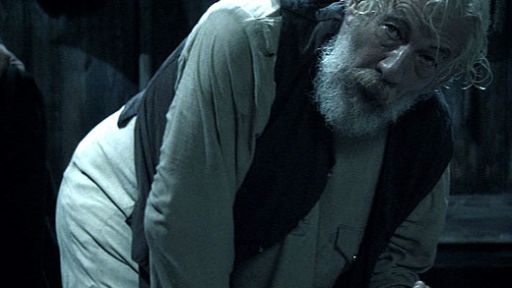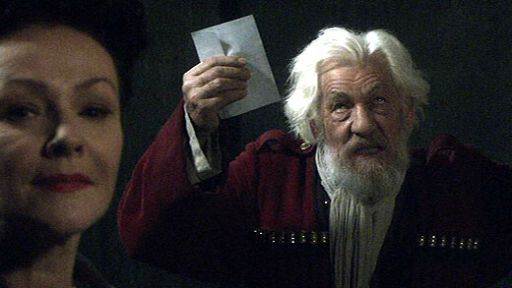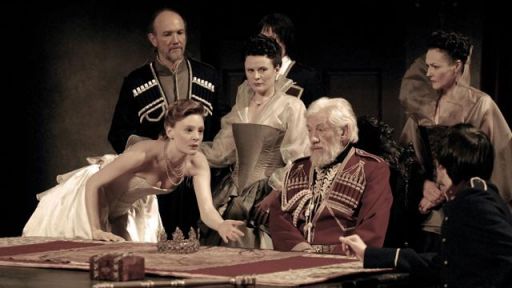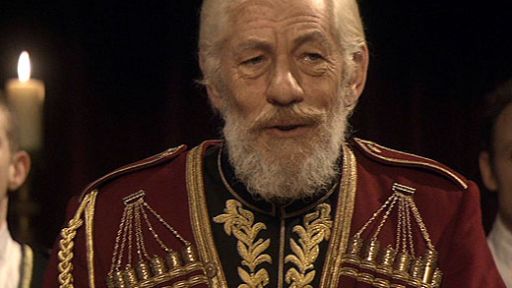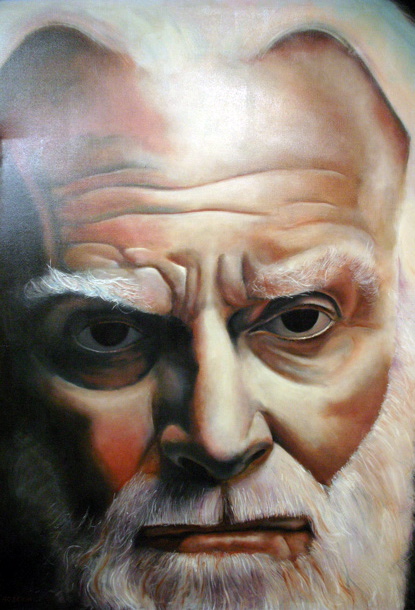
Painting of Olivier as Lear
By Chuck Rose at strugglingtopaint.blogspot.com
“Speak what we feel, not what we ought to say.” (Edgar)
At the end of King Lear Edgar asks the audience to “speak what we feel, not what we ought to say.” This is a call to both speak and to do so honestly. We may take it to mean relative to the play that we should ask after its meanings and effects honestly, what we feel, rather than package them in some well-known containers. This means adding our own thoughts and feelings to the play as we see its many complexities unfold. We might call it “creative engagement.” However, we cannot do whatever we want; the play must control our responses to it. As King Lear is long and complicated, some guidance would be helpful. This section looks at the play from various angles of vision, suggesting how they arise from the play, and then offers some questions to think about. You may chime in on any subject, or anything anyone else has said on the subject.
King Lear’s Strangeness in a Commonplace Shell
On paper King Lear looks like a play in five acts with acts divided into scenes, eleven principal characters, and a story about an old king who has various irrational reactions to his family which culminates in his entire family dying in the end. It resembles in this sense any number of tragedies written in ancient Greece, Renaissance England (including a few by Shakespeare), and the modern era. But at a layer just below this surface, King Lear mocks many stage conventions. It adds another entire plot; it explains few of the central motivations that drive the play; its treatment of time is out of joint; things that should lead to forward action do not; the Lear plot in the foreground crawls along, while the second plot, developed largely off stage, moves at a rapid pace. Much of what happens in the play seems inverted, upside down relative to our expectations, even for a tragedy. Yet it is claimed by many to be the greatest play ever written. How can this be? We will look into this question through the lens of what makes a play conventional, and how conventions can be broken usefully. Rebellion is all.
Reading the Play
The play when read is no more than words on a page. What must we add mentally to construct the play as it should be received (an imagined staged drama)? How is this different from a novel? On the other hand, what do we gain by reading the play carefully, indeed, repeatedly, without the annoying clock of the staged drama moving us remorselessly onward? Is this just as valid a procedure as watching the play being performed. What is lost in reading compared to watching it on stage or film? What is gained? It must be remembered that almost all stage and film productions cut the play substantially. The only way to obtain the whole—all of the words—is to read it.
A Mirror Up To Nature
Hamlet famously calls a play a “mirror up to nature.” But no work of art just makes a copy of nature, or the world as it is. It must reflect something we know of the world to be meaningful to us, but its value derives from how it takes what we already know and fashions something completely unreal from it. It is fiction after all, a form of writing that declares as a condition of reading it that it not be true, or false, in some important ways. How would we describe what is unreal in Lear? Is there any way of connecting what is unreal in Lear back to our experience of the world (the answer must be yes, what we will call interpretation)? Can it change our experience of the world?
Parallels, Symmetries, and Analogies—How to Make the Play Whole
Any play has structures. Lear has many. In particular, the play is full of parallels and symmetries that may be connected by analogies. The two plots serve as the most obvious example—two old fathers, quarrelling children divided between the good and the bad, the bad forsaking their father. But the full list is quite long and intriguing (and may be different among readers). What does it mean, for example, that the play begins with three people on the stage, and ends with three alive people on the stage, with Kent the only common member? How are Cordelia and the Fool parallel, and why? Why does Lear undress himself completely (perhaps) exactly midway through the play as written? What do these structures do to the play’s meaning?
The Many Faces of Lear
Over the four centuries of performances, the character of Lear himself has taken on many faces. The range within the extant movie versions is vast. He can begin the play with majesty, with a kind of foolish pride, with a dark determination, with the emotional state of a child, or in virtual senility. On the heath and on his way to Dover he can be just very angry, or outraged at the gods, or progressively but cogently mad, or completely broken. His moods in his scenes with Cordelia alive are more forced by what he says, but at the end he can again be in despair, or enraged, or in grief, or simply spent. What does any given treatment do to the play? Can the play be hopeful if Lear is not? Can Lear be played as hopeful in any convincing manner?
Metaphors in Lear
Metaphors provide one of the basic ways in which meanings may be found in a play which are not literally given in the play itself. It would be hard to miss the central metaphor of Macbeth, the blood that seems everywhere representing in a way the state of Macbeth’s soul. Lear presents several vehicles for potentially controlling metaphors—blindness, family, the division of the map (and hearts and minds), clothing or lack thereof, disguise itself, letters, the idea of physical nature. Each begins early and develops throughout the play. The first question is how? The second question is how do they mean other things (what a metaphor does)? And the third question is what then do they do to the meaning of the play.
The Importance of Minor Characters
Shakespeare often gives substantial weight to minor characters. In King Lear, Kent, the Fool, Albany, Oswald, and the King of France make memorable contributions to the play. The play gives each a positive moral value—even Oswald can be played for his loyalty and valor. Of the major characters, only Edgar seems free of moral stain (and some academics question even this assessment). What does this do for the play’s meaning? Is this life itself, where power and importance by themselves produce wickedness and grievous errors?
Great Lines—Help or Hindrance
Great lines abound in King Lear. Some have become so familiar that we listen for them, or rate the performance on how well they are said. (There may be no more terrifying stage experience than saying “to be or not to be.”) Does this help or hinder a grasp of the play as a whole? Does the fame of “how sharper than a serpent’s tooth it is to have a thankless child” make it difficult to take it ironically?
Should Lear Undress Completely in Act III
In his stage appearances in 1992, Ian Holm took off all his clothes when in Act III he asks to be unbuttoned, to expose “unaccommodated man.” Ian McKellen did the same for the RSC productions in 2007-8. (He does the same in the film, but you cannot see below his waist.) Is this necessary? Does it help or hinder the play? As we are still titillated by it (it is the most certain feature of the play to be mentioned in publicity and critical talk), does it become either self-conscious staging or a protest play? In many productions, Kent and the Fool prevent Lear from taking his clothes off, a gesture of love or mercy. Does this give the play a different meaning?
Modernizing King Lear
Many productions of King Lear modernize the staging. In the McKellen film, Cornwall interrupts the fight between Oswald and Kent with a pistol he fires in the air. In a melodramatic gesture, Edmund puts aside a pistol to fight Edgar with his sword and the gentlemen who secure Lear for his interview with Cordelia carry rifles. What does this do to the play? Does it make the play more accessible, or does it change its basic meaning in some way? Does the play have a basic meaning?
Negative Spaces—Things Said by Not Being Said
As with all great fictions, King Lear creates many negative spaces, things not said or seen that nevertheless materially affect the meaning of the play. The most obvious are the reasons for Lear’s original decision, his arbitrary love test, Gloucester’s gullibility, the unseen development of Edmund’s relationship with Goneril and Regan, and what happens to Lear between his rest outside Gloucester’s house and his reappearance near Dover. It is useful to make a list, and then ask what effect they do have on the play’s meaning.
The Play on Stage and the Play in Film
There are inherent differences between the play on stage compared to film. What are they? There are also some theories about the inherent differences between the two media. Are any of the them helpful? Can the play’s meaning be the same anyway, that is, can a director get the same idea of the play across on stage and film, or is Marshall McLuhan right, that the medium controls the destiny of the meaning?

